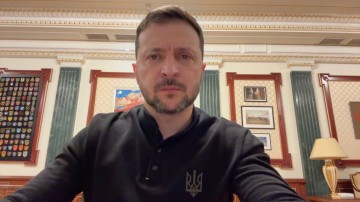The International Working Group on Sanctions against Russia chaired by Head of the Presidential Office Andriy Yermak and Director of the Freeman Spogli Institute for International Studies (FSI), Ambassador Michael McFaul laid the groundwork for the next round of sanctions imposed by the United States, Canada, the United Kingdom, and the European Union on individuals and companies facilitating the war against our country.
In particular, 554 items were added to the new US sanctions lists. Business recommendations "Risks and Considerations for Doing Business in the Russian Federation and the Russian-Occupied Territories of Ukraine" were also adopted. From now on, in addition to Iran, the DPRK, and Myanmar, these recommendations apply to Russia.
The sanctions lists include individuals associated with the abduction of Ukrainian children, energy sector companies, including those affiliated with Rosatom, microelectronics suppliers – companies from the UAE and China, Russian military-industrial complex manufacturers, the Mir National Payment Card System, financial institutions, investment companies, financial technology companies, and 25 tankers carrying Russian oil and Iranian weapons.
In addition, dozens of items on the sanctions lists relate to the production and supply of Shahed and Lancet UAVs and Russian missiles. Restrictions were imposed on Russian businessmen Andrey Komarov, Sergey Gordeev, and Konstantin Strukov.
The United States has also stepped up sanctions pressure on Russian IT companies, machine tool manufacturing and supply companies, microelectronics and aircraft parts suppliers, such as Aerostan, Navis, and Alabuga.
The UK has added almost 100 individuals and legal entities to the new sanctions list. In particular, these include the ammunition manufacturer Sverdlov, energy companies Novatek and Arctic LNG. Restrictions were imposed on oil trading companies, including Niels Troost, for circumventing oil price caps. The UK has also imposed sanctions on shadow fleet carriers: Fractal Marine DMCC, Beks Ship Management and Active Shipping, as well as companies from the diamond sector.
The sanctions list includes the CEO of Alrosa, individuals associated with copper, zinc and steel producers such as UMMC, Mechel, OMK, as well as entities from China, Türkiye, Switzerland and the Marshall Islands.
Canada has imposed sanctions on 163 people, and since the beginning of Russia's full-scale invasion, the country has imposed restrictions on 2,900 people. Canadian sanctions were imposed on Russian businessmen Andrey Molchanov and Andrey Bokarev, logistics companies Ust-Luga, Nafta, Novorossiysk Port, military-industrial complex enterprises, and other companies listed in the International Sanctions Group's reports on machine tools, drones, and aircraft. Canada imposed sanctions against propagandists such as the Federal News Agency and Krasnaya Zvezda. 20 military or dual-use goods are banned for use by Russia.
194 individuals have been added to the 13th EU sanctions package. Since the beginning of Russia's full-scale invasion, more than 2,000 people have been added to the EU sanctions lists. In addition to the military-industrial sector, restrictions have been imposed on logistics, certain IT companies and their executives, and individuals involved in the abduction of Ukrainian children. The EU imposed sanctions on producers of gunpowder, ammunition, and electronics. The sanctions lists include the National Helicopter Center Mil&Kamov, Arsenal Machine-Building Plant, Krasnoe Znamya, Iskra, Turbina, and SMT Logic, a regular supplier of weapons. The lists include companies from China, Türkiye, Serbia, India, Thailand, and Kazakhstan. The list of goods prohibited for export – components used in Russian UAVs – has also been expanded.
Australia imposed sanctions on 92 individuals (out of a total of 1,200 individuals on Australian sanctions lists). In particular, the restrictions apply to kidnappers of Ukrainian children. New Zealand approved the 25th sanctions package since Russia's full-scale invasion of Ukraine.
The Yermak-McFaul International Working Group continues its work to step up pressure on the aggressor state, Russia's military and political leadership, and other countries that support aggression against Ukraine. The war against our country should primarily cause damage to the aggressor so that it cannot finance its military machine.
"I am grateful to our partners, international experts, in particular my friend Michael, non-governmental organizations and all Ukrainian authorities. This is our joint result," emphasized Andriy Yermak.



